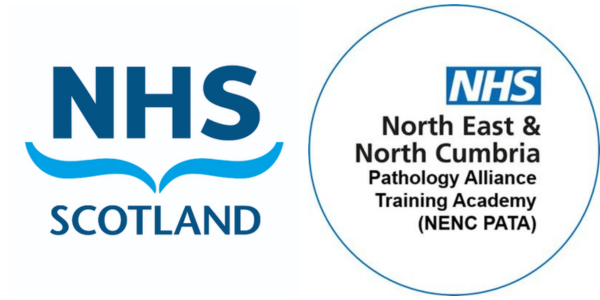New IBMS Registration Training Portfolio schemes kick off in Scotland and North East England

IBMS endorses the launch of the NHS Scotland Academy and North East North Cumbria Pathology Alliance Training Academy.
The NHS Scotland Academy (NHSSA) and North East North Cumbria Pathology Alliance Training Academy (NENC PATA) have recently accepted their first cohort of trainees on their new programmes, which will increase the number of graduates who are able to register with the Health and Care Professions Council (HCPC) as biomedical scientists.

Scotland’s Cohort 1 to Begin in October
NHSSA’s Accelerated IBMS Registration Training Portfolio Programme will support graduates from non-applied IBMS Accredited BSc (Hons) degree programmes (i.e. those without a clinical placement) to complete the IBMS Registration Training Portfolio (IBMS RTP) and enable their registration with the HCPC.
The programme will welcome its first cohort on the 8th of October and it will offer structured support for candidates to start their registration training portfolio evidence that will demonstrate how they meet the HCPC Standards of Proficiency .
Cohort 2 will begin on the 4th February 2025 with a deadline for applications on the 20th January 2025.
NENC PATA Lead the Way
While Scotland gears up for its first intake, the North East and North Cumbria Training Academy has already welcomed its first cohort of twenty trainee biomedical scientists onto its 12-month programme.
The trainees will conduct their 'on the bench' training in a regional laboratory, supported by training coordinators who will support the trainees as they complete the registration training portfolio modules, via group workshops or seminars either in-person or online. The training team have developed online teaching sessions that are being developed into e-learning by Technology Enhanced Learning Specialists to enable other trainees across the region (who are not in this cohort) to access this learning via a Learning Hub. The twenty trainees in the cohort are also mentored by the dedicated training coordinators who work for the NENC PATA team.
Michelle Payne, the Strategic Pathology Workforce and Education Lead, commenting on the programme:
“The North East and North Cumbria Pathology Alliance Training Academy seeks to deliver new models of training through a cross network, centralised approach. The model aligns to recommendations in the 2020 Diagnostics: Recovery and Renewal Report and those from the NHS England Pathology Transformation Programme. The training academy is part of a wider pathology workforce strategy in the North East and North Cumbria with a vision to cultivate and foster a skilled and flexible workforce that meets the current and future pathology needs of patients.”
The expected benefits of this training academy approach are a reduced training burden on laboratories, the upskilling of staff who have IBMS Accredited degrees but not had the opportunity to complete the IBMS registration training portfolio, and an improved quality of training through collaboration and sharing best practice, ultimately improving the quality of service.
A Boost for NHS Laboratories and Graduates
IBMS Executive Head of Education Dr Sue Jones commented:
“I am delighted to see the inaugural cohorts for the NHSSA and NENC PATA begin their training to become biomedical scientists. The Institute has been directly involved in the development of both training academies and welcomes these novel initiatives to streamline and coordinate completion of the IBMS registration training portfolio”
IBMS Chief Executive David Wells commented:
“This initiative is an example of the call to action in our Biomedical Scientist Long-Term Plan. Delivering the right training to ensure we bring forward the next generation of Biomedical Scientists into the medical laboratory.”
The IBMS will continue to work with our partners to expand the number of training positions to ensure that the NHS has the biomedical scientist workforce it needs for the future and enable more biomedical science graduates to become registered biomedical scientists.



